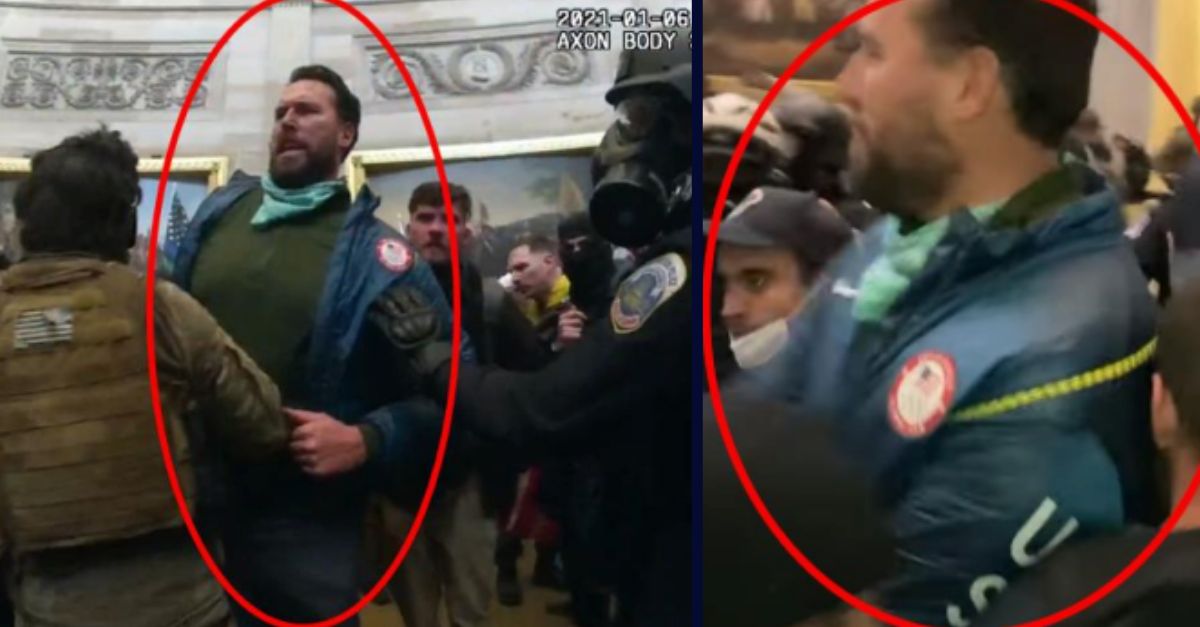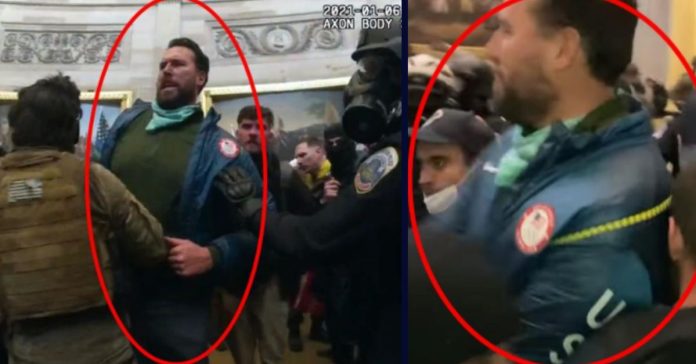
Two-time Olympic gold medalist swimmer Klete Keller is seen inside the U.S. Capitol on Jan. 6, 2021 (via FBI court filings).
A champion swimmer who raided the U.S. Capitol building on Jan. 6 while wearing a jacket bearing an Olympics patch and the letters “USA” will not be spending time behind bars.
Klete Keller, 41, of Colorado Springs, Colorado, was sentenced to probation on Friday. The two-time gold medalist was seen inside the Capitol building along with thousands of other Donald Trump supporters angry over Joe Biden’s win in the 2020 presidential election. Although his time in the Capitol was largely absent of physical violence — he was seen taking pictures with his cellphones and admitted to joining in obscene chants against top Democrats Nancy Pelosi and Chuck Schumer — he did admit to “shaking law enforcement officers off” as they tried to remove him and others from the Capitol Rotunda, according to court filings.
After leaving the Capitol, he threw his Olympic jacket in a trash can and destroyed his cellphone. When a probable cause affidavit for his arrest went public days after the riot, Keller turned himself in.
On Friday, U.S. District Judge Richard Leon, a George W. Bush appointee, sentenced Keller to 36 months of probation and six months of home confinement on Friday.
He pleaded guilty in September 2021 to one count of felony obstruction of an official proceeding. As Law&Crime previously reported, his plea agreement contemplated his cooperation with the federal government’s sprawling investigation into the Jan. 6 attack.
That cooperation, as well as what prosecutors describe as Keller’s unwavering acceptance of responsibility and cooperation, appears to have had an impact: although he faced a statutory maximum of 20 years behind bars, the government asked Leon to impose a sentence of 10 months behind bars and three years of probation.
“[H]e met with the government and proffered what he had done — including actions the government had not yet learned and might not have learned, such as his efforts to destroy evidence and throw away his jacket,” prosecutors noted. When he pleaded guilty, he was “one of a small number of individuals that were the first group” to publicly agree to cooperate with the government.
“Keller’s early, public cooperation mattered. Because of his high public profile, his cooperation generated a large amount of publicity,” the government’s sentencing memo said. “Given the unique circumstances around January 6, including the unprecedented number of individuals responsible and under investigation at the time Keller pled guilty, Keller’s early public cooperation plea undoubtedly reached thousands of others weighing whether to turn themselves in, plead guilty, or even cooperate. Keller’s public acknowledgment that his interference with the peaceful transfer of power was, in fact, a serious crime provided an important counterweight to the false narrative that January 6 was a peaceful, lawful protest.”
Although Keller didn’t end up testifying at any trial, “he aided various trial teams’ investigations and remained available for them to call to the stand.”
Prosecutors noted that Keller, who was on the same team as Michael Phelps in the 2004 Olympic Games in Athens, Greece, regretted his actions almost immediately.
“In his telling, Keller knew he had participated in a dark moment in American history when, on the train ride away from the Capitol, a kid asked to take a photograph with an Olympian,” the government said.
The government’s praise for Keller, however, was tempered by its condemnation of what he did.
“Klete Derik Keller once wore the American flag as an Olympian,” prosecutors’ sentencing brief began. “On January 6, 2021, he threw that flag in a trash can.”
The government quoted the Olympic motto of “Citius, Altius, Fortius — Communiter. Faster, Higher, Stronger — Together,” and said that Keller’s actions at the Capitol “helped tear this country apart, communities apart, families apart, and even individual people apart as they confront what they did.”
“Within a week, however, Keller began the process of fixing what he helped break,” the government’s brief noted.
In a letter to the court, Keller said that he has been participating in a federal government program aimed at supporting incarcerated people.
“Since my case began, I have learned about how the Department of Justice is striving to improve programs for disadvantaged people,” Keller’s letter said. “Wanting to help, I started volunteering with Prison Professors Charitable Corporation to develop coursework for currently incarcerated individuals. I recorded a course about what it took for me to qualify for the Olympics. I hope these lessons about hard work and discipline will help many justice-impacted people start productive new lives.”
Have a tip we should know? [email protected]

